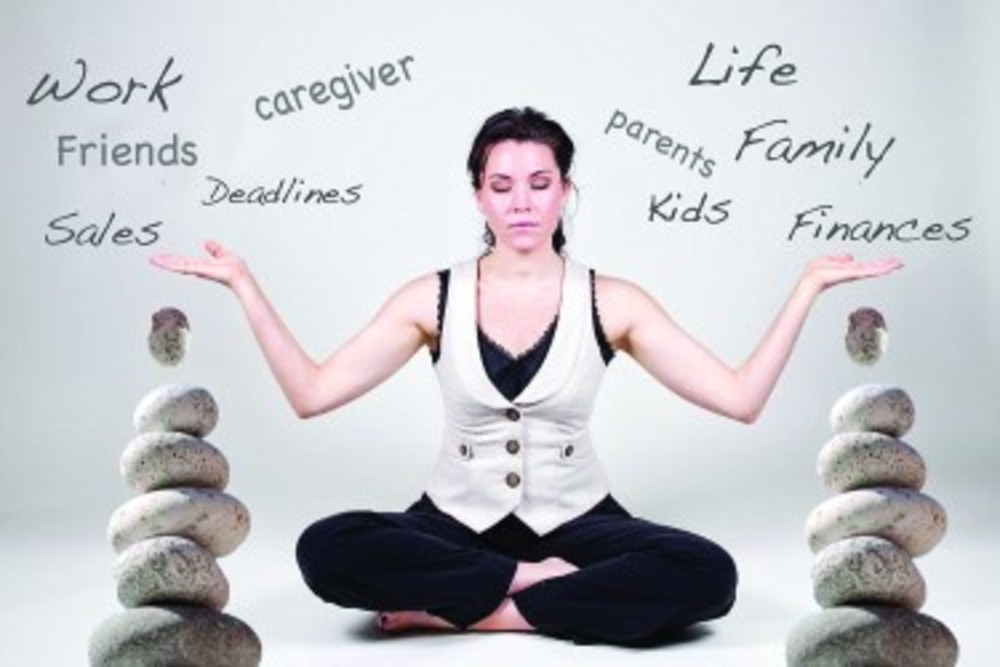Working toward balance for a busy life
Remember to take care of yourself along the way
 What does it mean to live a balanced life? In general, balance is experienced as a relative lack of stress: not feeling pulled in too many directions, generally feeling calm, happy and well-organized and not feeling terribly overwhelmed. Perhaps a better judge of balance is one’s subjective experience: When you don’t have it, you know it!
What does it mean to live a balanced life? In general, balance is experienced as a relative lack of stress: not feeling pulled in too many directions, generally feeling calm, happy and well-organized and not feeling terribly overwhelmed. Perhaps a better judge of balance is one’s subjective experience: When you don’t have it, you know it!
Improving one’s experience of balance often involves behavior change, an intentional process that can feel very overwhelming. People who are trapped in feeling that their life is unbalanced often make the mistake of doing the same thing over and over again – and like the famous quote from Rita Mae Brown, they expect different results despite this. There are certainly exceptions to this rule, such as when the imbalance is due to an intractable life event such as intensive caretaking due to the decline of a parent or a health crisis. However, even in those instances, it is important to identify ways to maintain or introduce participation in other areas of life that bring pleasure or gratitude.
One way to feel more balanced is to start off with a brief self-analysis. Busy people juggle many obligations, which generally fall into the following specific areas: health, family, spirituality, friends, solitude, finance, work, leisure and householding. How do you divide your time between these key areas? Are there other areas that take significant time and energy? Jot down some notes and try to assess where your time is spent. Do you notice any areas that stand out, as either time/energy heavy or places you don’t spend enough time? Think about each of these elements and consider how important each is for you.
Certain areas demand significant attention: The primary breadwinner will spend more time and energy at work; the adult child of ailing parents will have more time with family. These responsibilities will ebb and flow over time and as life’s crises arise. However, even for those whose energy is strongly focused in one area by necessity, in which of the other categories do you have the opportunity to enhance? Does solitude ground you and provide means for reflection, and contemplation? Does seeing a friend allow for caring for another and feeling connected? Does attending to your own spiritual need increase the experience of wonder, appreciation for your surroundings and enable the feeling known as part of a community?
In a busy life, we don’t feel we have TIME to readjust and make change. However, no one else can do it for you! Sometimes a slight shift can feel markedly different. Think about your life and the key areas where you spend your time. If you could change something, what would it be? Is that change a reasonable goal for yourself? If it isn’t, try again.
We know that the process of setting goals is an important part of behavior change. Think about your goal not as something you SHOULD do, but something you want to do and something you are likely to follow through on. If you are having trouble identifying a reasonable goal, think through some questions:
• How is my health? What can I do to improve it?
• Do I want to strengthen my relationships?
• How can I create (more) time for contemplation?
• Where do I want to be financially?
• What do I like to do that I don’t make time for?
• How can I enhance my spiritual practice?
• What will make me feel like a valued member of my community?
Look for the choices you have and take responsibility for the choices you make. If you choose to stay late at work and skip family dinner, own that. It may not feel like a choice, but often it is – and your dissatisfaction may be powerful enough to push you toward making a different choice the next time. When do you say yes? When do you say no? If you make a different choice the next time, will the outcome be different? Be aware how your sense of balance responds to taking on more.
Paulo Coehlo said, “When you say yes to others, make sure you aren’t saying no to yourself.” Identify where setting good limits with others is beneficial. Tell yourself that it’s okay to say “no”.
Making change is difficult, and it’s important to take care of yourself along the way. Some of the changes will result in decreased stress and improved self-care – but remember to be kind to yourself as you try to make changes and use whatever strategies you have to make your life simpler.
NICOLE JELLINEK (nicole@jfsri.org) is a licensed clinical social worker from Jewish Family Service’s Kesher program.







